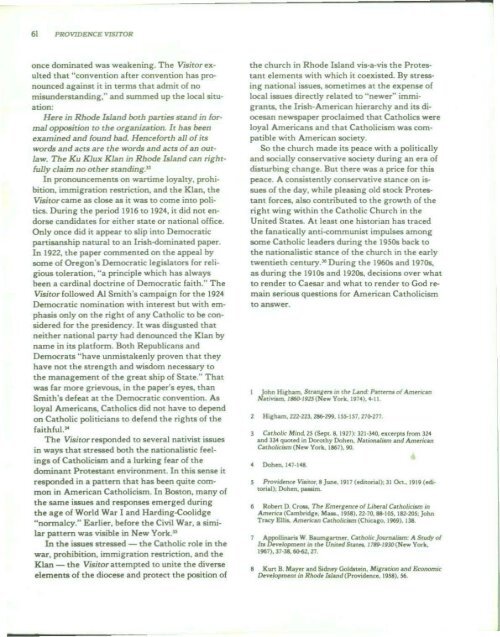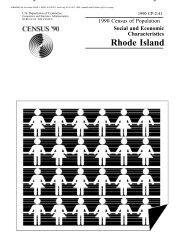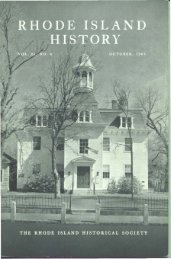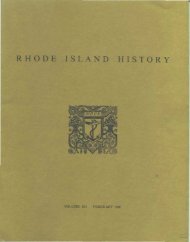RHODE ISLAND HISTORY - Rhode Island Historical Society
RHODE ISLAND HISTORY - Rhode Island Historical Society
RHODE ISLAND HISTORY - Rhode Island Historical Society
- No tags were found...
You also want an ePaper? Increase the reach of your titles
YUMPU automatically turns print PDFs into web optimized ePapers that Google loves.
61 PROVIDENCE VISITORonce dominated was weakening. The Visitor exultedthat "convention after convention has pronouncedagainst it in terms that admit of nomisunderstanding:' and summed up the local situation:Here in <strong>Rhode</strong> <strong>Island</strong> both parties stand in forma/opposition to the organization. It has beenexamined and found bad. Henceforth a11 ofirswords and acts are the words and acts ofan outlaw.The Ku Klux Klan in <strong>Rhode</strong> <strong>Island</strong> can rightfuJJyclaimno other standing. DIn pronouncements on wartime loyalty. prohibition,immigration restriction. and the Klan, theVISitor came as dose as it was to come into politics.During the period 1916 to 1924, it did not endorsecandidates for either state or national office.Only once did it appear to slip into Democraticpartisanship natural to an Irish-dominated paper.In 1922, the paper commented on the appeal bysome of Oregon's Democratic legislators for religioustoleration, "a principle which has alwaysbeen a cardinal doctrine of Democratic faith." TheVisirorfollowed AI Smith's campaign for the 1924Democratic nomination with interest but with emphasisonly on the right of any Catholic to be consideredfor the presidency. It was disgusted thatneither national party had denounced the Klan byname in its platform. Both Republicans andDemocrats "have unmistakenly proven that theyhave not the strength and wisdom necessary tothe management of the great ship of State." Thatwas far more grievous, in the paper's eyes, thanSmith's defeat at the Democratic convention. Asloyal Americans. Catholics did not have to dependon Catholic politicians to defend the rights of thefaithful. )0The Visirorresponded to several nativist issuesin ways that stressed roth the nationalistic feelingsof Catholicism and a lurking fear of thedominant Protestant environment. In this sense itresponded in a pattern that has been quite commonin American Catholicism. In Boston, many ofthe same issues and responses emerged duringthe age of World War I and Harding-Coolidge"normalcy." Earlier, before the Civil War, a similarpattern was visible in New York.:UIn the issues Stres&e'd - the Catholic role in thewar, prohibition, immigration restriction, and theKlan - the Visitor attempted to unite the diverseelements of the diocese and protect the position ofthe church in <strong>Rhode</strong> <strong>Island</strong> vis-a-vis the Protestantelements with which it coexisted. By stressingnational issues, sometimes at the expense oflocal issues directly related to "newer" immigrants.the Irish-American hierarchy and its diocesannewspaper proclaimed that Catholics wereloyal Americans and that Catholicism was compatiblewith American society.So the church made its peace with a politicallyand socially conservative society during an era ofdisturbing change. But there was a price for thispeace. A consistently conservative stance on issuesof the day. while pleasing old stock Protestantforces, also contributed to the growth of theright wing within the Catholic Church in theUnited States. At least one historian has tracedthe fanatically anti-communist impulses amongsome Catholic leaders during the 19505 back tothe nationalistic stance of the church in the earlytwentieth century.- During the 19605 and 19705.as during the 19105and 19205, decisions over whatto render to Caesar and what to render to God remainserious questions for American Catholicismto answer.2 Hilham. 222·123. 286-299. lSs-t57, 271)-277.3 c.thoJk Mind. 25 (~pt . 8. 1927); 321·l4O . ncerpu from 324and 334 quote











